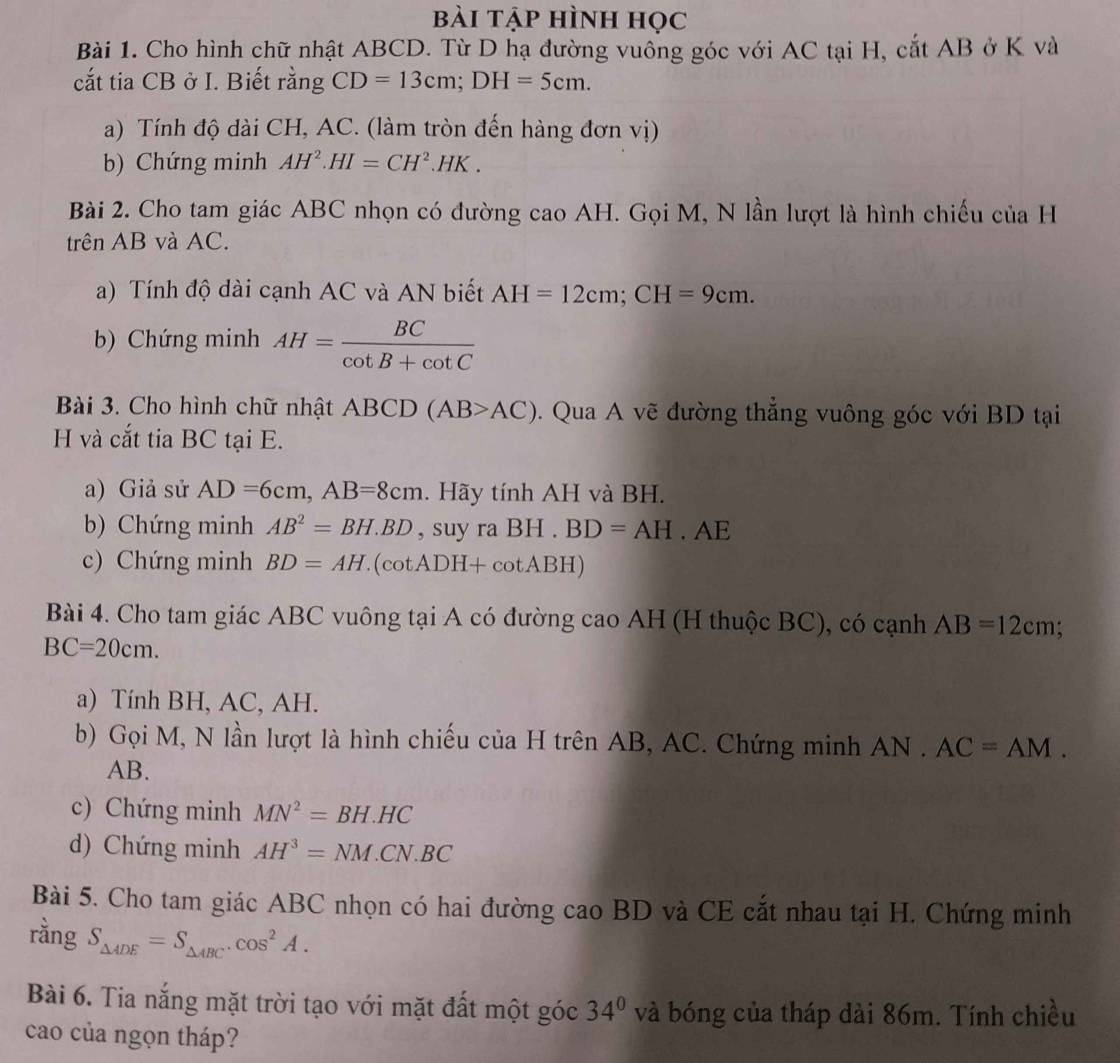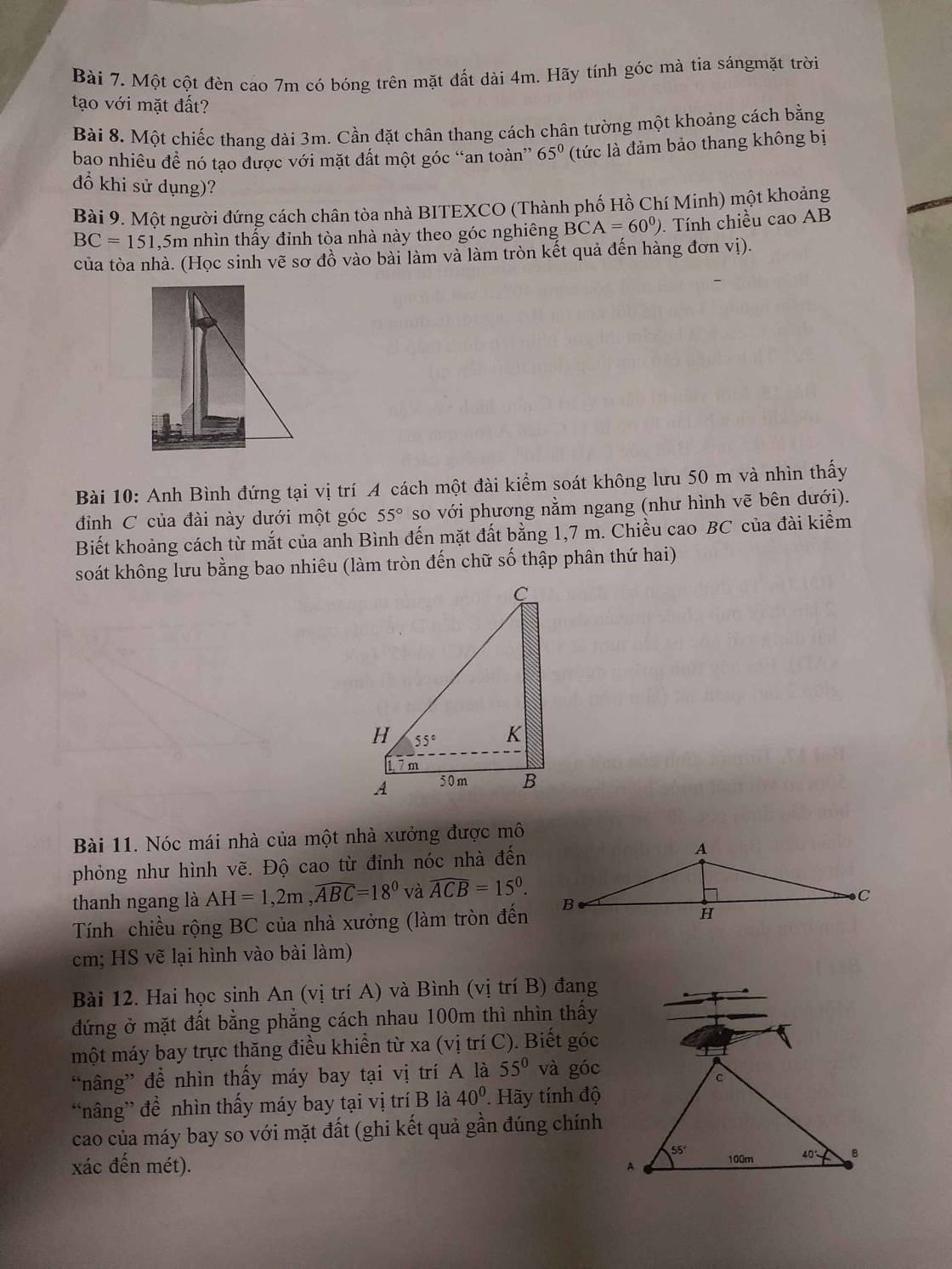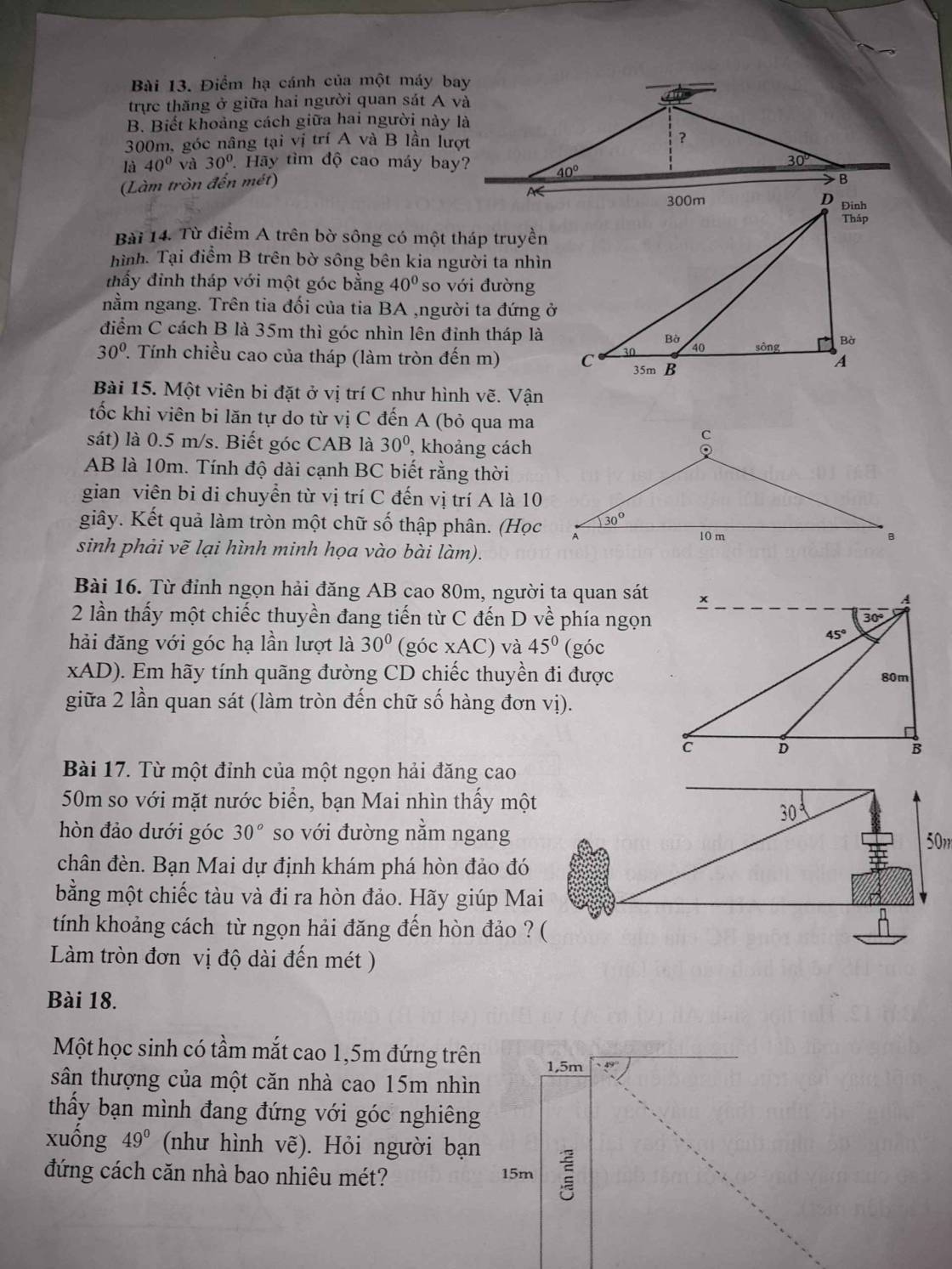Hãy nhập câu hỏi của bạn vào đây, nếu là tài khoản VIP, bạn sẽ được ưu tiên trả lời.

Bạn cần giúp bài nào ạ? Nếu bạn cần giúp hết, bạn tách các câu ra từng CH riêng nhé, không ai làm hết được tất cả trong 1 CH đâu bạn, mà có làm thì chất lượng cũng chưa được cao.

\(x^2-8\sqrt{3x+7}=3x-32\)
\(\Leftrightarrow\left(x^2-6x+9\right)+\left(3x+7-8\sqrt{3x+7}+16\right)=0\)
\(\Leftrightarrow\left(x-3\right)^2+\left(4-\sqrt{3x+7}\right)^2=0\)
\(\Leftrightarrow x=3\)

\(x^2-3x+\frac{7}{2}=\sqrt{\left(x^2-2x+2\right)\left(x^2-4x+5\right)}\)
\(\Leftrightarrow2x^2-6x+7=2\sqrt{\left(x^2-2x+2\right)\left(x^2-4x+5\right)}\)
Đặt \(\hept{\begin{cases}\sqrt{x^2-2x+2}=a>0\\\sqrt{x^2-4x+5}=b>0\end{cases}}\)
\(\Rightarrow a^2+b^2=2ab\)
\(\Leftrightarrow\left(a-b\right)^2=0\)
\(\Leftrightarrow a=b\)
\(\Leftrightarrow\sqrt{x^2-2x+2}=\sqrt{x^2-4x+5}\)
\(\Leftrightarrow2x=3\)
\(\Leftrightarrow x=\frac{3}{2}\)
\(x^2-3x+\frac{7}{2}=\sqrt{\left(x^2-2x+2\right)\left(x^2-4x+5\right)}\)
\(\Leftrightarrow x^2-3x+\frac{7}{2}-\frac{5}{4}=\sqrt{\left(x^2-2x+2\right)\left(x^2-4x+5\right)}-\frac{5}{4}\)
\(\Leftrightarrow\frac{4x^2-12x+9}{4}=\frac{\left(x^2-2x+2\right)\left(x^2-4x+5\right)-\frac{25}{16}}{\sqrt{\left(x^2-2x+2\right)\left(x^2-4x+5\right)}+\frac{5}{4}}\)
\(\Leftrightarrow\frac{\left(2x-3\right)^2}{4}-\frac{x^4-6x^3+15x^2-18x+10-\frac{25}{16}}{\sqrt{\left(x^2-2x+2\right)\left(x^2-4x+5\right)}+\frac{5}{4}}=0\)
\(\Leftrightarrow\frac{\left(2x-3\right)^2}{4}-\frac{\frac{16x^4-96x^3+240x^2-288x+135}{16}}{\sqrt{\left(x^2-2x+2\right)\left(x^2-4x+5\right)}+\frac{5}{4}}=0\)
\(\Leftrightarrow\frac{\left(2x-3\right)^2}{4}-\frac{\frac{\left(2x-3\right)^2\left(4x^2-12x+15\right)}{16}}{\sqrt{\left(x^2-2x+2\right)\left(x^2-4x+5\right)}+\frac{5}{4}}=0\)
\(\Leftrightarrow\left(2x-3\right)^2\left(\frac{1}{4}-\frac{\frac{4x^2-12x+15}{16}}{\sqrt{\left(x^2-2x+2\right)\left(x^2-4x+5\right)}+\frac{5}{4}}\right)=0\)
\(\Rightarrow x=\frac{3}{2}\)
Bài làm của mk cho ai khùng thôi, bn tham khảo cx dc :v

ĐK: \(3x^2-2x-3\ge0\)(1)
Đặt : \(\sqrt{3x^2-2x-3}=t\left(t\ge0\right)\)
Ta có : \(3x^2-2x-3=t^2\Leftrightarrow3x^2=t^2+2x+3\)
Thế vào ta có phương trình :
\(t^2+2x+3+3x+2=\left(x+6\right).t\)
<=> \(t^2-\left(x+6\right)t+5x+5=0\)
<=> \(\left(t^2-\left(x+1\right)t\right)-\left(5t-5\left(x+1\right)\right)=0\)
<=> \(t\left(t-x-1\right)-5\left(t-x-1\right)=0\)
<=> \(\left(t-x-1\right)\left(t-5\right)=0\)
<=> \(\orbr{\begin{cases}t-x-1=0\\t-5=0\end{cases}}\)
Với \(t-x-1=0\Leftrightarrow t=x+1\)
Ta có phương trình: \(\sqrt{3x^2-2x-3}=x+1\)
<=> \(\hept{\begin{cases}x+1\ge0\\3x^2-2x-3=x^2+2x+1\end{cases}\Leftrightarrow}\hept{\begin{cases}x\ge-1\\x^2-2x-2=0\end{cases}\Leftrightarrow}\orbr{\begin{cases}x=1+\sqrt{3}\\x=1-\sqrt{3}\end{cases}}\)( thỏa mãn đk (1))
Với \(t-5=0\Leftrightarrow t=5\)
Ta có phương trình : \(\sqrt{3x^2-2x-3}=5\Leftrightarrow3x^2-2x-28=0\Leftrightarrow\orbr{\begin{cases}x=\frac{1-\sqrt{85}}{3}\\x=\frac{1+\sqrt{85}}{3}\end{cases}}\)( tm)
Vậy : ....
Đặt t = √(3x² - 2x - 3) ≥ 0 (ĐK(*) => 3x² + 3x + 2 = (3x² - 2x - 3) + 5(x + 1) = t² + 5(x + 1)
Thay vào pt ta có:
t² + 5(x + 1) = (x + 6)t
<=> t² - t(x + 1) - 5t + 5(x + 1) = 0
<=> t(t - x - 1) - 5(t - x - 1) = 5
<=> (t - 5)(t - x - 1) = 0
TH1 t - 5 = 0 <=> t = 5 (thỏa mãn đk (*) => 3x² - 2x - 3 = 25
<=> 9x² - 6x + 1 = 85
<=> (3x - 1)² = 85
<=> 3x - 1 = ± √85
<=> x = (1/3)(1 ± √85)
TH2 t - x - 1 = 0 <=> t = x + 1 => 3x² - 2x - 3 = (x + 1)² <=> x² - 2x + 1 = 3 <=> (x - 1)² = 3 <=> x - 1 = ± √3 <=> x = 1 ± √3
=> t = 2 ± √3 > 0 (thỏa mãn Đk (*)

PT⟺3x4−4x3=(1−√x2+1)(1+√x2+1+x2+1)PT⟺3x4−4x3=(1−x2+1)(1+x2+1+x2+1)
⟺3x4−4x3=−x21+√x2+1.(2+x2+√x2+1)⟺3x4−4x3=−x21+x2+1.(2+x2+x2+1)
⟺⎡⎣x=03x2−4x+2+x2+√x2+11+√x2+1=0⟺[x=03x2−4x+2+x2+x2+11+x2+1=0
Ta thấy 2+x2+√x2+11+√x2+1≥322+x2+x2+11+x2+1≥32
Cái này biến đổi tương đương.
Do đó 3x2−4x+2+x2+√x2+11+√x2+1≥3x2−4x+32>03x2−4x+2+x2+x2+11+x2+1≥3x2−4x+32>0 không thỏa mãn phương trình
Do đó phương trình ban đầu có nghiệm duy nhất x=0



\(x^2+\sqrt{x^2-3x+5}=3x+7\)
=>\(\sqrt{x^2-3x+5}=x^2-3x-7\)(1)
Đặt \(x^2-3x+5=a\left(a>=\dfrac{11}{4}\right)\)
(1) sẽ trở thành \(\sqrt{a}=a-12\)
=>\(a=\left(a-12\right)^2\)
=>\(a^2-24a+144-a=0\)
=>\(a^2-25a+144=0\)
=>(a-9)(a-16)=0
=>\(\left[{}\begin{matrix}a=9\\a=16\end{matrix}\right.\Leftrightarrow\left[{}\begin{matrix}x^2-3x+5=9\\x^2-3x+5=16\end{matrix}\right.\)
=>\(\left[{}\begin{matrix}x^2-3x-4=0\\x^2-3x-11=0\end{matrix}\right.\Leftrightarrow\left[{}\begin{matrix}x\in\left\{4;-1\right\}\\x=\dfrac{3\pm\sqrt{53}}{2}\end{matrix}\right.\)